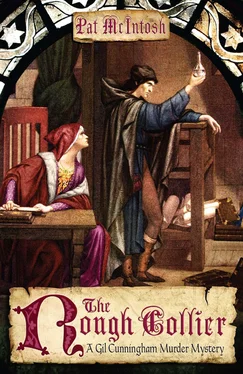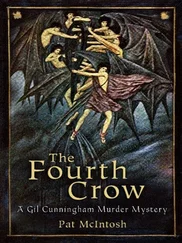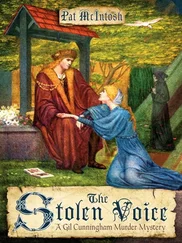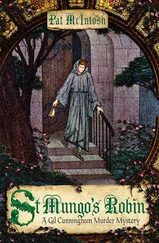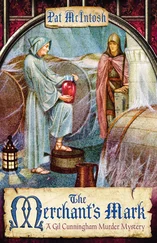Pat McIntosh - The Rough Collier
Здесь есть возможность читать онлайн «Pat McIntosh - The Rough Collier» весь текст электронной книги совершенно бесплатно (целиком полную версию без сокращений). В некоторых случаях можно слушать аудио, скачать через торрент в формате fb2 и присутствует краткое содержание. Жанр: Исторический детектив, на английском языке. Описание произведения, (предисловие) а так же отзывы посетителей доступны на портале библиотеки ЛибКат.
- Название:The Rough Collier
- Автор:
- Жанр:
- Год:неизвестен
- ISBN:нет данных
- Рейтинг книги:4 / 5. Голосов: 1
-
Избранное:Добавить в избранное
- Отзывы:
-
Ваша оценка:
- 80
- 1
- 2
- 3
- 4
- 5
The Rough Collier: краткое содержание, описание и аннотация
Предлагаем к чтению аннотацию, описание, краткое содержание или предисловие (зависит от того, что написал сам автор книги «The Rough Collier»). Если вы не нашли необходимую информацию о книге — напишите в комментариях, мы постараемся отыскать её.
The Rough Collier — читать онлайн бесплатно полную книгу (весь текст) целиком
Ниже представлен текст книги, разбитый по страницам. Система сохранения места последней прочитанной страницы, позволяет с удобством читать онлайн бесплатно книгу «The Rough Collier», без необходимости каждый раз заново искать на чём Вы остановились. Поставьте закладку, и сможете в любой момент перейти на страницу, на которой закончили чтение.
Интервал:
Закладка:
‘Aye, poor soul. Mind, her first man could never ha’ done her any good, the way he sickened as soon’s he brought her home, but this one that’s been murdered in the peat-cutting is a different matter, you’d think.’ Eppie glanced round the hall, checked that her daughters were engrossed, and lowered her voice. ‘He’s near as bad as that Fleming that’s sub-steward at Cauldhope. Free wi’ his hands, and full of bold talk. I’ll wager he’s one to insist on his rights.’
‘Mind you, I have heard otherwise about Fleming now.’
‘Oh, aye, now.’ A giggle, a sideways glance, an upward flick of the eyebrows. ‘His culter’s rusted away, all right. That’s three lassies they say he’s persuaded to his bed since St John’s Day last, and then found he couldny stand to do his part. What a judgement on him!’ Another gurgling laugh which made the baby chuckle in sympathy.
‘A judgement?’
‘Well, Agnes Paton in Cauldhope kitchens never had a penny piece for the bairn he gied her last year, that was born at Yule, and he did no better by any of the other lassies. Deserves him right, that’s what I say, and a pity it doesny happen to others.’
‘It’s no way to behave,’ agreed Alys, ‘and him a priest too. And Murray? Is he the same, then? Does he go after other women?’
‘I’ve never heard it,’ admitted Eppie with regret. ‘But you can aye tell, the way he talks, he’d like to. My man says it’s no him that was got out of the peat-digging,’ she recalled. ‘Maybe that’s where he’s vanished away to, he’s gone off to somebody else. Poor Mistress Brownlie.’
‘I wonder what she will do now. Does she have kin? Can she go to them?’
‘Oh, I think she’s well placed up at the coal-heugh, by what you hear,’ said Eppie. ‘She’s got two brothers, I think Jess tellt me at the time, but they’re a good piece older. One of them’s got bairns near her age. They’d maybe no want to take her in.’
‘Two brothers,’ Alys repeated. ‘Where are they, then? I’d have thought they would be here to help her in this trouble.’
‘Oh, not them.’ Eppie looked down at her son, who was lying against her breast chewing drowsily on his crust. ‘The way I heard it,’ she said happily, ‘they never had much time for her. I suppose they were no too pleased when she was born, they must ha’ thought all their father’s gear would be theirs and here was another to share it wi’, and they both got themselves wedded and settled elsewhere as soon as they might. And that, said Jess to me, just made it worse, for there was the lassie still at home to be made a pet of, and after her mother died she kept her father’s house and he bought her jewels and all sorts, and then made sure she’d a good tocher when she was wedded, and all that was so much less to divide amongst the three of them at his death.’
‘It’s a sad tale,’ said Alys, privately wondering if Eppie’s last statement was correct. Her own considerable dowry, she knew, had been by way of an advance against whatever she might inherit when — when — but then, there was no brother or sister to share it with. ‘No wonder Mistress Brownlie prefers to stay up at the coal-heugh. Where did you say her brothers were settled?’
‘Let me see now.’ Eppie adjusted the weight of the sleeping baby and considered, staring into the distance with vague blue eyes. ‘Is one of them in Draffan, maybe? I know who would tell you,’ she suggested, ‘and that’s Sir Simon over at St Mary’s in Dalserf. Or maybe Sir John here in the town.’
Sir John Heriot and his clerk were singing Sext in the chancel of St Andrew’s kirk. There were a few old women in the nave, murmuring over their beads in a soft organum to the chant which floated out under the double chancel arch. Alys sat down on the ledge at the wall and looked about, and the maidservant who had walked down with her, a young girl quite overcome by the responsibility of accompanying Maister Gil’s lady, retreated to the other side of the door and drew her own beads from their place in her girdle.
The stonework of the little building was good, though the carving at the head of the chancel pillar was simple; the windows were neatly constructed and carefully set, and the swallow’s-nest pulpit on the south wall was well done. The church was too old, she thought, for Gil’s father to have been the original donor, but whoever had built it had summoned experienced masons. The paintings on the plastered walls were clumsy, but the saints they depicted were clear enough: St James the pilgrim, St Roch, St Anne teaching the Virgin to read, a gruesome and comical Doom on the west wall. St Andrew presided as a small, brightly coloured statue on an altar beside the double chancel arch.
The Office was ended. The final Amen, drawn out on enough notes to stuff a cushion, faded into the rafters, and the sounds of tidying began with the heavy slither and flap of pages turning as the book was set up for Nones. Alys rose, shaking out her skirts, and watched the arches for the appearance of Sir John.
She had considered her appearance with care; her wired headdress and good wool gown set her aside from the country women, but she had deliberately chosen a plaid rather than a mantle to put round her shoulders. No point in alarming her quarry. She had also considered her story on the walk in from Belstane, quite relieved that the girl with her was too shy to chatter. With regret, she had discarded various constructions based on the romances she loved; it seemed improbable that anyone would believe her to be a long-lost scion of the Lockharts, or the daughter of a nobleman stolen by pirates. Besides, she thought, and laughed at herself, she had no convenient birthmark to support such a fiction.
Sir John emerged from the dim chancel, a big fair man with a broad face, and his clerk slipped past as the priest was pounced on by two of the old women with a complicated tale of wrongdoing by a neighbour. Alys waited, watching how he dealt with them, and at length he noticed her and drew her into the conversation.
‘You’re a stranger here, daughter?’ he said. His accent was not local, though Alys could not place it. She curtsied, and introduced herself, at which all three exclaimed, blessed themselves, blessed her, offered good wishes on her marriage. It was clear that Lady Cunningham was well regarded in the town.
‘And is it no Belstane where the man’s came up out the peat all uncorrupted?’ said the larger and stouter of the women. ‘Who is he, do they ken yet?’
Alys explained the situation, and they discussed it with interest, Sir John concerned, the two women offering various wild guesses about the identity of the corpse. This took a while, but eventually the second woman, a small withered person with claw-like hands and sharp eyes, said, ‘So you came in to hear the Office, mistress?’
‘Yes, indeed,’ Alys agreed, ‘and to admire this kirk, which my good-mother told me was worth the walk. She was certainly right in that.’
This was well received. The best features of the building had to be pointed out and described as if she was unable to see them, and the donors identified. Lady Egidia had given the candlesticks to the Lady-altar.
‘And Sir James Douglas sees to St James’s altar,’ said the first woman, ‘and Lockhart at the Lee gave us that St Roch, o’ course.’
‘Naturally,’ said Sir John. ‘Indeed.’
‘Lockhart,’ said Alys, seizing the chance. ‘I wonder, could you tell me something. Is there a Marion Lockhart lives here in Carluke town?’
‘Marion?’ said the small woman. ‘No a Marion. There’s Mysie, and Eppie, and Jess.’ She counted on her fingers. ‘Aye, and Maggie and Nan.’
‘Eppie Lockhart’s youngest is a Marion,’ said the other woman, and sucked noisily on her remaining teeth.
Читать дальшеИнтервал:
Закладка:
Похожие книги на «The Rough Collier»
Представляем Вашему вниманию похожие книги на «The Rough Collier» списком для выбора. Мы отобрали схожую по названию и смыслу литературу в надежде предоставить читателям больше вариантов отыскать новые, интересные, ещё непрочитанные произведения.
Обсуждение, отзывы о книге «The Rough Collier» и просто собственные мнения читателей. Оставьте ваши комментарии, напишите, что Вы думаете о произведении, его смысле или главных героях. Укажите что конкретно понравилось, а что нет, и почему Вы так считаете.
